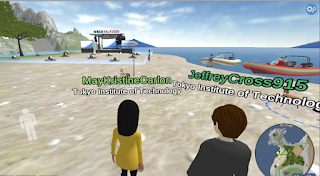TALE 2020: A Review of Quantitative Offline Measurement Tools for Computer-Based Metacognitive Tutoring Effectiveness Assessment
The IEEE International Conference on Teaching, Assessment, and Learning for Engineering (TALE) is an annual conference sponsored by the IEEE Education Society in the Asia Pacific region. This conference was held in an interactive environment by Virbela. While there had been several technical troubles, it was, overall, an interesting experience.
 |
| Interactive environment |
For a copy of relevant materials (e.g., presentation, paper) or any questions you may have, please feel free to reach out to me through the Contact Me gadget on this blog's sidebar.
Details
Title: A Review of Quantitative Offline Measurement Tools for Computer-Based Metacognitive Tutoring Effectiveness Assessment
Authors: May Kristine Jonson Carlon, Jeffrey S. Cross
Venue: 2020 IEEE International Conference on Teaching, Assessment, and Learning for Engineering (TALE)
Date: December 8 to 11, 2020
DOI: 10.1109/TALE48869.2020.9368470 ($$)
Abstract
With the ability to track learner interactions and enable self-paced learning, computer-based instructions are ideal platforms for investigating metacognitive tutoring. However, measuring metacognitive development can be challenging. Online measurements, such as analyzing activity logs or conducting think-aloud procedures, can be cost-prohibitive or difficult to ensure reliability. While online measurement tools like questionnaires have their disadvantages, such as being self-reported, they can be economical to measure metacognition. Being quantitative will add more advantages since the results will more likely be easier to interpret. Unfortunately, it can be difficult for novice researchers and instructors who want to use computers for metacognitive instruction to know about suitable quantitative offline measures. A review surveying these tools exclusively in computer-based instruction is yet to be done to the best of our knowledge. Studies from 2010 to 2019 were collected, analyzed, and grouped based on the tools used to fill this gap. These are then analyzed according to their merits and demerits. This research aims to assist other researchers in finding alternative ways to determine computer-based metacognitive tutoring's effectiveness.
Comments
Post a Comment